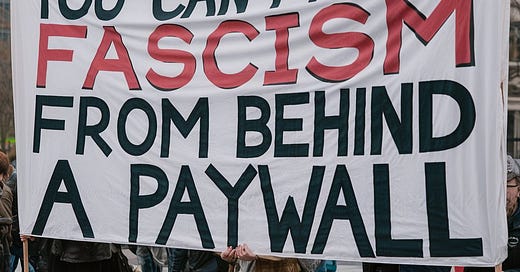The fight against fascism isn’t won with whispers behind closed doors. Paywalls don’t just hinder the flow of information—they betray the very principles of resistance. In an era where reality itself is under siege, locking knowledge away behind subscriptions is as good as surrendering to the forces of propaganda. But paywalls are just the tip of the iceberg. The real crisis? AI is killing history.
Search engines were once portals to the past, guiding us through the labyrinth of original sources and the archives of forgotten knowledge. Today, those portals are being bricked over. Generative AI and synthesized search results promise ease but deliver ignorance. Instead of leading you to sources, these systems regurgitate summaries that strip context and bury truth. What’s worse, they obscure the very existence of original materials, reducing history to an algorithm’s fleeting interpretation.
This isn’t just a technological flaw; it’s a catastrophe. Without access to original documents, we can’t verify, interrogate, or challenge narratives. AI systems—designed and trained by those already in power—amplify their biases and marginalize dissenting voices. Meanwhile, entire websites vanish overnight—victims of media bankruptcies and a digital economy indifferent to preservation. Even the mighty Internet Archive, one of the last bastions of historical preservation, faces existential threats from funding crises, legal battles, and cybersecurity attacks. If the Archive falls, so does the digital memory of our civilization.
The Propaganda Machine in Overdrive
Into this void of historical amnesia steps the propaganda machine. Contemporary politics, awash in disinformation campaigns, thrives in a world where records can be scrubbed and scandals erased. Politicians weaponize the internet’s eroding memory to rewrite history on the fly. Entire chapters of the public record vanish, replaced with sanitized or outright false narratives. This isn’t a dystopian warning; it’s happening right now.
Propaganda is most potent when the public is disarmed. If we can’t access the past, we lose our ability to expose lies, confront contradictions, and demand accountability. The truth becomes whatever the powerful say it is, and resistance becomes an uphill battle fought with dwindling resources.
We don’t have the luxury of complacency. The fight against AI’s erasure of history and the stranglehold of paywalls requires radical action. Knowledge must be liberated, not parceled out to the highest bidder. Paywalls need to fall—not because journalists and creators don’t deserve to be paid, but because democracy cannot survive in the dark. Alternative funding models, public investment, and collective ownership of information resources are not optional; they are essential.
Equally critical is the defense of platforms like the Internet Archive. These institutions must be treated as public goods, safeguarded with robust funding, cybersecurity protections, and legal guarantees. At the same time, we must demand that AI systems serve the public interest. Transparency, citation, and accountability must be built into their design. The fight for open knowledge is the fight for truth itself.
The Future of Authority Demands a Fight
When history is erased and access to knowledge is restricted, fascism doesn’t just survive—it thrives. Fighting back means arming ourselves with the messy, raw, unfiltered truths that the powerful want us to forget. We can’t let AI’s synthesized reality replace the depth and richness of original sources. We can’t let paywalls deny us the tools we need to resist. And we can’t let propaganda rewrite the past while we look the other way.
This is not a call for incremental change; it’s a call for revolution. Tear down the barriers to knowledge. Protect the archives. Demand accountability from AI systems. The battle for the future of authority is not won in silence or apathy—and it certainly won’t be won from behind a paywall.





This is an important point I wish more folks would hear: "Paywalls need to fall—not because journalists and creators don’t deserve to be paid, but because democracy cannot survive in the dark. Alternative funding models, public investment, and collective ownership of information resources are not optional; they are essential." (also: welcome back Metaviews, sadly you're needed more than ever)